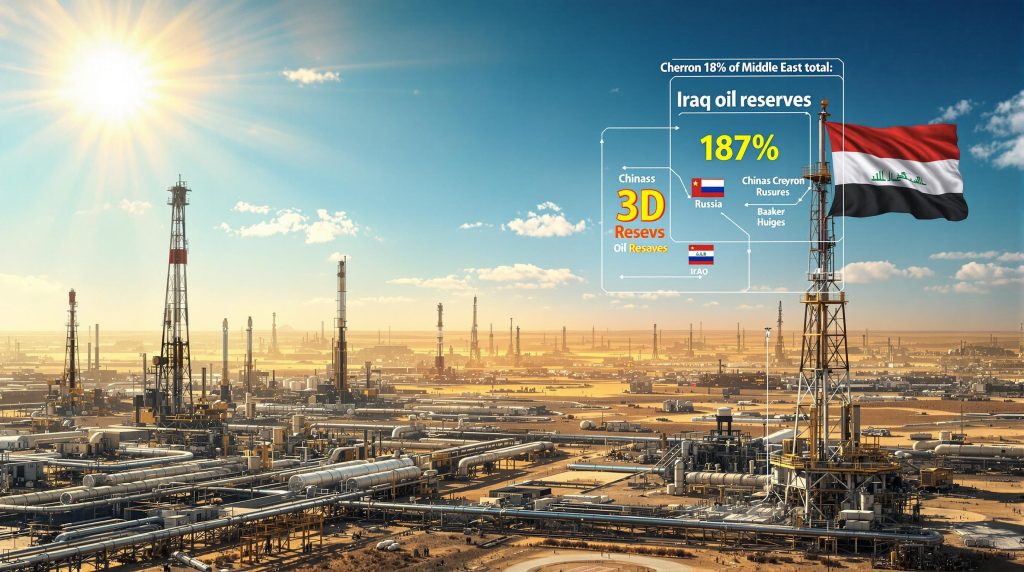Understanding the Geopolitical Chessboard in Iraq
Iraq's strategic position in global geopolitics cannot be overstated, particularly when it comes to energy resources. The country sits at the crossroads of major international powers' interests, with its vast oil reserves making it a crucial piece on the global chessboard.
The Strategic Importance of Iraq's Energy Resources
Iraq possesses between 145 and 215 billion barrels of proven oil reserves, according to conservative estimates from the Energy Information Administration and unofficial higher estimates. This massive resource represents nearly 18% of the Middle East's total oil reserves, positioning Iraq as the fifth largest oil reserve holder globally.
The country's geographical advantage is equally significant. Iraq shares borders with Syria to the west (providing Mediterranean Sea access) and Turkey to the north, creating natural pathways for oil transportation. This strategic location establishes Iraq as a vital link connecting Eastern and Western markets.
Beyond simply holding reserves, Iraq's position makes it instrumental for major infrastructure projects, including China's ambitious Belt and Road Initiative. Control of these resources translates directly into both economic leverage and political influence in the broader Middle East region.
The Competing Superpower Strategies
Major global powers view Iraq as a critical geopolitical and energy prize, with each pursuing distinct strategies to secure influence. As one senior Russian administration official reportedly stated to OilPrice.com, "By keeping the West out of energy deals in Iraq, the end of Western hegemony in the Middle East will become the decisive chapter in the West's final demise."
This stark assessment highlights the high stakes involved in Iraq's energy sector. Control of Iraqi oil resources represents significant economic and political leverage that extends far beyond the country's borders. For China, Russia, and Western powers, securing a foothold in Iraq means gaining advantage in global energy markets and regional influence.
Iraq's position as a crossroads for major international infrastructure projects further amplifies its importance. The country can serve as a crucial hub for pipelines, transportation networks, and trade routes that connect Asia, Europe, and the Middle East. This makes Iraq not merely valuable for its resources but also for its position as a gateway between continents.
What's Driving the U.S. Return to Iraqi Oilfields?
After years of diminished presence, U.S. energy companies are making a concerted effort to reestablish their position in Iraq's oil sector. This renewed interest stems from both economic opportunities and broader geopolitical calculations.
Countering Growing Chinese and Russian Influence
China has established a significant foothold in Iraq through strategic agreements. The "Oil for Reconstruction and Investment" agreement signed in September 2019 laid the groundwork for Chinese companies to invest in Iraqi infrastructure projects in exchange for oil. This was further expanded with the "Iraq-China Framework Agreement" in 2021.
These foundation agreements have enabled Chinese firms to develop dual-purpose civilian and military infrastructure under the Belt and Road Initiative, effectively embedding Chinese influence deeply within Iraq's economy and security framework.
Similarly, Russia has pursued energy partnerships and security cooperation with Baghdad, further challenging Western influence in the region. The combination of Chinese economic power and Russian security cooperation has created a formidable challenge to traditional Western dominance in Iraqi energy.
U.S. companies' return represents a strategic counterbalance to this growing Eastern influence. After years of declining Western presence, American firms are seeking to reestablish their position in one of the world's most resource-rich nations.
The Strategic Value of Kurdistan
The semi-autonomous Kurdistan region has historically served as a leverage point for Western influence in Iraq. The region has maintained independent oil production and export operations, often working directly with Western energy companies outside Baghdad's control.
This arrangement has provided Western powers with a foothold in Iraq's energy sector even when relations with the central government in Baghdad were strained. However, recent legal rulings by Iraq's Federal Supreme Court have begun to challenge Kurdistan's oil independence.
Baghdad is now pushing aggressively for unified control of all Iraqi oil and gas resources, directly threatening this Western strategic advantage. The outcome of this struggle between Kurdistan's autonomy and Baghdad's centralization efforts will significantly impact the balance of international influence in Iraq.
Which U.S. Companies Are Leading the Return?
Several major American energy companies are spearheading the U.S. return to Iraqi oilfields, each securing strategic positions in different segments of the country's energy sector.
Chevron's New Iraqi Ventures
Chevron has made significant inroads, with the Iraqi Cabinet recently authorizing the Oil Ministry to sign a non-binding memorandum with the American energy giant. This formal authorization represents a major step in Chevron's reentry into Iraq's oil sector.
The company's focus is primarily on two major projects: developing the Nasiriyah oil project and advancing the Balad oil field. These ventures represent significant re-engagement by one of America's largest energy corporations and signal confidence in Iraq's potential despite ongoing challenges.
Chevron's return is particularly notable given the company's global stature and technical expertise. The development of these fields could significantly increase Iraq's production capacity while establishing a strong American corporate presence in the country's energy sector, potentially contributing to an oil price rally in global markets.
SLB's Strategic Contract
SLB (formerly Schlumberger) has secured an important contract with Iraq's Oil Ministry focused on increasing natural gas production at the Akkas gas field. This agreement is particularly significant as it replaced a previous contract held by Ukrainian company Ukrzemresurs.
The focus on natural gas production demonstrates U.S. interest in diversifying Iraq's energy outputs beyond crude oil. Natural gas development could help Iraq reduce its dependence on imported energy for domestic power generation while creating an additional export revenue stream.
SLB's contract highlights the technological advantages American companies can bring to Iraq's energy sector, particularly in the development of complex gas fields that require sophisticated production techniques. According to reports from Reuters, these technological capabilities may help overcome some of the U.S. oil production challenges faced domestically.
Baker Hughes' Expanding Presence
Baker Hughes has conducted high-level meetings with Iraqi Prime Minister Mohammed Al-Sudani, focusing on potential cooperation and investment opportunities. These discussions have centered on the development of oil fields and the capture of associated gas that is currently flared.
This engagement represents broader U.S. services sector interest in Iraqi energy development. Baker Hughes brings specialized expertise in field development, production optimization, and gas capture technologies that could significantly enhance Iraq's production efficiency.
According to highly-placed security and energy sources in Washington and London, these initial agreements are just the beginning, with "many more deals" forthcoming from U.S. companies and their allies. This suggests a coordinated effort to reestablish Western influence in Iraq's energy sector.
What Challenges Face Western Companies in Iraq?
Despite the opportunities, Western energy companies face substantial challenges operating in Iraq's complex political and security environment.
Security Concerns and Regional Tensions
Recent drone strikes on energy infrastructure highlight the ongoing security risks in Iraq. HKN's Sarsang block in Kurdistan was hit by drone strikes from "unknown assailants," demonstrating the vulnerability of energy operations in the region.
These attacks reflect broader regional proxy conflicts that continue to threaten energy operations throughout Iraq. Western companies must navigate this complex security landscape, often requiring significant investment in protection measures and contingency planning.
The security situation is further complicated by shifting regional alliances and the presence of various non-state actors with interests in disrupting energy operations. Companies must factor these security costs and risks into their investment decisions when considering Iraqi operations.
Legal and Contractual Uncertainties
Ongoing disputes between Baghdad and Kurdistan over oil control create significant legal uncertainties for Western companies. Iraq's Federal Supreme Court rulings, particularly those issued on February 21, 2024, have severe implications for contractual stability.
These rulings mandate that Kurdistan must turn over "all oil and non-oil revenues" to Baghdad, directly challenging the legal basis for independent contracts signed with the Kurdistan Regional Government. Companies operating in Kurdistan now face the potential for litigation from the federal government.
HKN, for example, has been threatened with legal action by the Iraqi government for signing a deal with Kurdistan without federal approval. This demonstrates the real legal risks companies face when caught between competing governmental authorities.
The Budget-for-Oil Payment Structure
Baghdad has reintroduced the 2014 "Budget Payments-for-Oil Deal" as its proposed solution to the Kurdistan oil dispute. Under this arrangement, all Kurdistan oil exports would transfer to federal SOMO (State Organization for Marketing of Oil) control.
In return, Kurdistan would receive $16 per barrel based on a minimum delivery of 230,000 barrels per day. However, there are historical issues with Baghdad meeting its payment obligations under similar arrangements in the past.
This payment structure creates significant financial risks for companies operating in Kurdistan, as they may face delayed payments or contractual renegotiations. The uncertainty surrounding payment reliability adds another layer of complexity to investment decisions in Iraq's energy sector.
How Does This Affect the Global Energy Landscape?
The changing dynamics of Iraq's oil sector have significant implications for global energy markets and geopolitical relationships.
Implications for Global Oil Markets
Iraq's production capacity directly impacts the global supply-demand balance. As OPEC's second-largest producer, changes in Iraqi output can influence global oil prices and market stability.
Western technical expertise could potentially increase Iraqi production efficiency, recovery rates, and overall output. Improved field management and enhanced oil recovery techniques could unlock additional production from existing fields, adding significant volumes to global markets.
The diversification of operating companies in Iraq may also improve production stability. Rather than having the sector dominated by companies from a single country or bloc, a more balanced international presence could create redundancies that protect against political disruptions.
Increased investment could accelerate field development and recovery rates, potentially adding several hundred thousand barrels per day to Iraq's production capacity over the medium term. This would strengthen Iraq's position within OPEC while providing additional supply to global markets, creating a significant OPEC production impact on price stability.
The Geopolitical Ripple Effects
Changing control of Iraqi energy resources has profound implications for regional power dynamics. The U.S. return directly challenges Chinese Belt and Road Initiative ambitions in the region, creating a competitive environment for influence.
This competition extends beyond commercial interests to include broader strategic considerations. Control of energy resources provides leverage in regional diplomacy and can influence alliance structures throughout the Middle East.
There are also potential impacts on Iran's regional influence and sanctions evasion efforts. Iraq has served as an important economic partner for Iran during periods of international sanctions, and changes in Iraqi energy governance could affect these relationships.
Within OPEC+, shifts in Iraqi production and political alignment could influence production coordination and policy formation. As a major producer, Iraq's position on production cuts and market management carries significant weight within the organization, potentially affecting oil price crash dynamics in volatile markets.
What Are the Economic Stakes for Iraq?
The energy sector dominates Iraq's economy, making the management of oil resources central to the country's economic future.
Revenue Generation and Economic Development
Oil exports account for approximately 90% of Iraq's government revenue, making the sector's development crucial for national finances. The effective management of these resources directly impacts the government's ability to provide services and invest in development.
Western investment brings potential for technology transfer and modernization of Iraq's energy infrastructure. Advanced drilling techniques, reservoir management, and production optimization could increase recovery rates and extend field lifespans.
Competition between foreign companies may improve contract terms for Iraq. With multiple international players vying for access, the Iraqi government potentially gains leverage to negotiate more favorable revenue splits, investment commitments, and local content requirements.
The development of associated gas resources could significantly reduce energy imports for domestic power generation. Iraq currently flares large volumes of associated gas due to insufficient capture infrastructure, representing both an economic loss and environmental problem that foreign investment could address.
Infrastructure Development Opportunities
Energy sector investment typically drives broader infrastructure improvements beyond the immediate oil and gas facilities. Roads, ports, power generation, and water treatment facilities often receive development as part of comprehensive energy projects.
These investments create potential for increased employment in both direct and supporting industries. Beyond the jobs directly associated with oil production, service industries, logistics, and local suppliers benefit from expanded energy operations.
Modernization of production facilities could improve efficiency and environmental performance. Older Iraqi fields often utilize outdated equipment with poor emissions controls and inefficient recovery methods that new investment could upgrade.
Development of downstream industries such as petrochemicals and refining creates economic diversification opportunities. These value-added industries can generate additional revenue streams while creating skilled employment outside of primary extraction activities.
How Might This Impact Kurdistan's Autonomy?
The changing energy landscape poses existential challenges to Kurdistan's semi-autonomous status.
Financial Pressures on Kurdistan Regional Government
Kurdistan's economic viability depends heavily on independent oil sales. Without control of its energy resources and the associated revenue, the Kurdistan Regional Government would face severe financial constraints.
Baghdad's legal challenges directly threaten Kurdistan's financial independence. The Federal Supreme Court rulings mandating the transfer of "all oil and non-oil revenues" to the central government would effectively end Kurdistan's independent fiscal operations.
Western companies' decisions impact Kurdistan's bargaining position. If major international firms align with Baghdad's centralization efforts, Kurdistan loses important partners that have previously supported its autonomous energy policy.
This could lead to increased dependency on Baghdad for budget allocations, fundamentally altering the power relationship between the Kurdistan Regional Government and the federal authorities. Financial independence has been a cornerstone of Kurdistan's practical autonomy since 2003.
The Push for Unified Control
The February 2024 Federal Supreme Court rulings represent a significant legal victory for Baghdad's centralization efforts. These rulings provide the legal foundation for the federal government to assert control over all energy resources in Iraq, including those in Kurdistan.
Prime Minister Mohammed Al-Sudani has emphasized that the new Unified Oil Law will constitute "a strong factor for Iraq's unity." This framing presents energy centralization as a national unity project rather than simply an economic policy.
Baghdad seeks to end Kurdistan's independent oil sales by transferring all exports to federal SOMO control. Under the proposed Budget-for-Oil Deal, Kurdistan would receive $16 per barrel based on a minimum delivery of 230,000 barrels per day, but would lose direct control of its exports.
Western companies are caught between competing governmental authorities in this dispute. Companies with existing Kurdistan contracts face potential legal action from Baghdad, while those seeking new opportunities must carefully navigate the complex jurisdictional claims.
What's the Historical Context of U.S. Involvement in Iraqi Oil?
Understanding the current dynamics requires examining the historical trajectory of U.S. engagement with Iraq's energy sector.
The Post-2003 Era
U.S. companies entered Iraq following the 2003 invasion with high expectations for dominant positions in the country's oil sector. The removal of Saddam Hussein's regime was anticipated to create favorable conditions for Western energy firms.
However, these initial expectations gave way to a more complex reality. Early technical service contracts offered limited profitability compared to production-sharing agreements available in other countries, dampening Western enthusiasm.
Over time, Iraq's oil sector evolved toward more diverse international participation. Chinese, Russian, Malaysian, and European companies secured significant positions alongside American firms, creating a multinational landscape rather than Western dominance.
During periods of heightened instability, particularly during the rise of ISIS, some Western firms withdrew or reduced their presence in Iraq. This created opportunities for companies from other countries to expand their footprint in the sector.
The Rise of Chinese and Russian Influence
Chinese companies secured major positions in southern Iraqi fields through a combination of favorable financial terms and political backing. Chinese firms demonstrated willingness to accept lower returns and higher risks than some Western counterparts.
Russian firms established presence through strategic acquisitions and partnership with Iraqi state companies. Companies like Lukoil and Gazprom Neft secured important development contracts in major fields such as West Qurna-2.
Western companies faced increasing competition and political challenges as Iraq's government diversified its international partnerships. Baghdad's strategic calculation included balancing relations between East and West rather than relying exclusively on Western partners.
This pivot toward eastern powers accelerated in recent years, particularly with the 2019 "Oil for Reconstruction and Investment" agreement and the 2021 "Iraq-China Framework Agreement" that formalized China's growing role in Iraq's economy and energy sector, creating significant US-China trade war impacts that extend into the energy domain.
What's Next for U.S. Energy Companies in Iraq?
The future trajectory of U.S. involvement in Iraqi oil depends on both commercial considerations and broader strategic factors.
Potential Expansion of Western Presence
Reports from highly-placed security and energy sources in Washington and London indicate that "many more deals" are forthcoming from U.S. companies and their allies. This suggests a coordinated strategic effort rather than isolated commercial decisions.
The timing appears favorable with changing regional dynamics. Reduced tensions between Saudi Arabia and Iran potentially create a more stable regional environment for energy investment.
A reduced Iranian regional security threat, resulting from evolving diplomatic relationships, creates opportunity for Western companies previously concerned about proximity to Iranian-aligned groups in Iraq.
Russia's geopolitical influence is potentially diminished by other global commitments, particularly its ongoing conflict in Ukraine. This may reduce Russia's capacity to challenge Western reengagement in Iraq's energy sector.
Balancing Risk and Reward
Companies must navigate a complex political environment where contracts and legal frameworks remain subject to change. The ongoing dispute between Baghdad and Kurdistan demonstrates the potential for shifting regulatory landscapes.
Security concerns remain a significant factor in operational planning. Despite improvements in Iraq's overall security situation, targeted attacks on energy infrastructure continue to pose risks that companies must mitigate.
Contractual terms and payment reliability present ongoing challenges. Iraq's history of payment delays and contractual disputes requires companies to carefully structure agreements to protect their investments.
Competition with Chinese and Russian firms continues to intensify. These companies often
Want to Profit from the Next Major Mineral Discovery?
Stay ahead of the market with Discovery Alert's proprietary Discovery IQ model, which instantly notifies investors of significant ASX mineral discoveries and transforms complex data into actionable insights. Explore historic examples of exceptional investment returns by visiting Discovery Alert's dedicated discoveries page and begin your 30-day free trial today.




